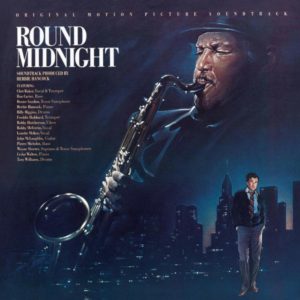For a portrait of the artist as a child who never grew up, look at Dexter Gordon’s smile: the gummy grin of a six-year-old, even when he was ravaged by ill health. Dexter compensated by growing up vertically, standing 196 centimetres in his socks, his massive hands making a tenor saxophone shrink to the size of an alto. Then, at 63, this musical giant unexpectedly gave one of the great screen performances in the best fictional jazz film ever made: Bertrand Tavernier’s Round Midnight.
Plagued by emphysema, diabetes and liver and kidney problems, Dexter could manage few hours on set each day, but this just compounded the veracity of his performance as Dale Turner, a legend on the skids. Dale was loosely based on virtuoso bebop pianist Bud Powell, and fundamentally the film is about the tragedy of greatness unrequited.

Dexter helped skim any phony dialogue off the script, aiding Tavernier’s efforts to make the musicians seem credible in a way never achieved before. More radically, the director recorded the music live on set for the first time, to stunning effect, and musical director Herbie Hancock shrewdly contrived an idiom that allowed the players to be their 1986 selves, while underscoring the film’s 1959 setting. And what players: Hancock and Dexter were joined by Bobby McFerrin, Wayne Shorter and Chet Baker, among others. The only weak link was the weird choice of singer Lonette McKee.
As good as the soundtrack album is, the Oscar it won was more deserved by Dexter. As Tavernier said, no specialist actor could have brought “one millionth of the truth” that Dexter did – not to mention his overflowing humanity, whether blowing into a saxophone, or just being: the shambling walk, the hand gestures, the slow, rumbling voice with which he makes Dale’s lines sing. “You don’t just go and pick a style off a tree one day,” he says. “The tree’s inside you growing naturally.” “I’m dying of everything except music,” he says later, and when asked why he seems so on edge, he voices every artist’s fear: “Because I keep wondering if I still have something to give.”
Some critics suggested Dexter was merely playing himself. One might reasonably expect them to know this is what most actors do most of the time – just not as well as Dexter.
 Dale also tells us that there’s not enough kindness in the world, although Dexter’s massive, warm tenor sound helps redress the balance. In the 1940s it was h who softened the spikiness of bebop with his unique combination of that sound, loping phrasing, tenderness and unstoppable drive. To hear him in his absolute pomp, listen to such 1960s albums as Go, or the version of A Night in Tunisia on Our Man in Paris (where he lived for many years). Yet on certain levels he was never greater than during Round Midnight, four years before he died. On Autumn in New York the sound doesn’t so much infiltrate your ears as wrap itself around you, and on Body and Soul he digs as deeply into that melody as anyone.
Dale also tells us that there’s not enough kindness in the world, although Dexter’s massive, warm tenor sound helps redress the balance. In the 1940s it was h who softened the spikiness of bebop with his unique combination of that sound, loping phrasing, tenderness and unstoppable drive. To hear him in his absolute pomp, listen to such 1960s albums as Go, or the version of A Night in Tunisia on Our Man in Paris (where he lived for many years). Yet on certain levels he was never greater than during Round Midnight, four years before he died. On Autumn in New York the sound doesn’t so much infiltrate your ears as wrap itself around you, and on Body and Soul he digs as deeply into that melody as anyone.
It’s a life lived fully that comes sprawling from the saxophone’s bell. The son of a doctor who counted Duke Ellington among his patients, Dexter encountered highs and lows commensurate with his size, like some sleepy river that dries to cracked mud in a drought, and irrigates whole valleys when in flood. After his initial burst of 1940s glory he fell out of fashion in the cool-jazz ’50s, and fell into heroin. Back in action in 1960, he had his first taste of acting when also composer/musician for an LA production of a play called The Connection. This moved to New York, and the next thing Dexter knew he had a five-album contract with Blue Note Records.
At the end of the last day of shooting Round Midnight he quietly asked Tavernier, “How long will it take me to get over this movie?” Some of us are still trying.
The Round Midnight soundtrack streams on Spotify and Apple Music; on disc from Birdland Records.